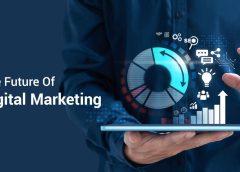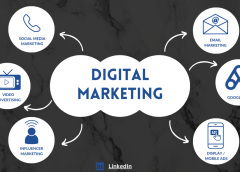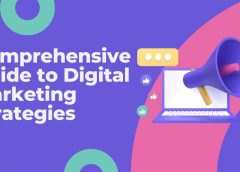In today’s fast-paced digital landscape, businesses are continually seeking innovative ways to reach and engage their target audience. With the evolution of technology, digital marketing has emerged as a powerful tool to connect brands with consumers on various platforms. In this article, we’ll explore key digital marketing platforms and strategies, discuss the effectiveness of inbound versus outbound marketing, and delve into a successful campaign case study.
Digital Marketing Platforms and Software:
Digital marketing encompasses a vast array of platforms and software designed to help businesses reach their marketing goals. Some of the most popular platforms and tools include:
- Social media platforms like Facebook, Instagram, Twitter, and LinkedIn, which allow businesses to engage with their audience, share content, and run targeted advertising campaigns.
- Search engine optimization (SEO) tools such as SEMrush, Ahrefs, and Moz, which help businesses improve their website’s visibility and rankings on search engine results pages.
- Email marketing platforms like Mailchimp, Constant Contact, and HubSpot, which enable businesses to send personalized and targeted emails to their subscribers.
- Content management systems (CMS) like WordPress and Drupal, which provide businesses with the tools to create, manage, and optimize their website content.
- Analytics tools such as Google Analytics, which provide businesses with insights into their website traffic, audience demographics, and campaign performance.
Inbound vs. Outbound Marketing:
When it comes to digital marketing strategies, the debate between inbound and outbound marketing often arises. Inbound marketing focuses on attracting customers through valuable content and experiences, such as blogs, social media, and search engine optimization. It aims to educate and engage potential customers, ultimately leading them to make a purchase decision.
On the other hand, outbound marketing involves reaching out to customers through more traditional methods, such as cold calling, direct mail, and advertising. While outbound marketing can be effective in reaching a large audience quickly, it is often seen as interruptive and less personalized compared to inbound marketing.
Success Story:
One of the most successful digital marketing campaigns in recent years was launched by a leading e-commerce retailer. The campaign focused on leveraging social media influencers to promote their products to a highly targeted audience.
By partnering with influencers who had a strong following within their target demographic, the retailer was able to reach millions of potential customers and drive significant sales. The influencers created engaging content featuring the retailer’s products, which resonated with their audience and led to a surge in brand awareness and sales.
Additionally, the retailer utilized data-driven targeting and personalized messaging to further optimize the campaign’s performance. By analyzing customer behavior and preferences, they were able to deliver relevant content and offers to each individual, increasing the likelihood of conversion.
The Future of Digital Marketing: Trends and Innovations
As technology continues to evolve, the landscape of digital marketing is constantly shifting. To stay ahead of the curve, businesses must keep a pulse on the latest trends and innovations shaping the industry.
One such trend is the rise of video marketing. With platforms like YouTube, TikTok, and Instagram Reels gaining popularity, video content has become an essential component of any digital marketing strategy. Businesses are harnessing the power of video to tell compelling stories, showcase products, and connect with their audience on a more personal level.
Another emerging trend is the use of artificial intelligence (AI) and machine learning in marketing. AI-powered tools and algorithms can analyze vast amounts of data to identify trends, predict consumer behavior, and personalize marketing messages in real-time. From chatbots and virtual assistants to predictive analytics and recommendation engines, AI is revolutionizing how businesses interact with their customers.
Furthermore, the growing importance of sustainability and ethical marketing cannot be overstated. Consumers are becoming increasingly conscious of the environmental and social impact of their purchasing decisions. Businesses that prioritize sustainability and transparency in their marketing efforts can build trust and loyalty with environmentally and socially conscious consumers.
In addition to these trends, the future of digital marketing is likely to be shaped by advancements in augmented reality (AR), voice search optimization, and immersive experiences. By embracing these technologies and staying agile in their approach, businesses can position themselves for success in the ever-changing digital landscape.
In conclusion, digital marketing offers businesses endless opportunities to connect with their audience and drive meaningful results. By leveraging the right platforms, strategies, and tools, businesses can reach new heights of success in today’s competitive landscape.





